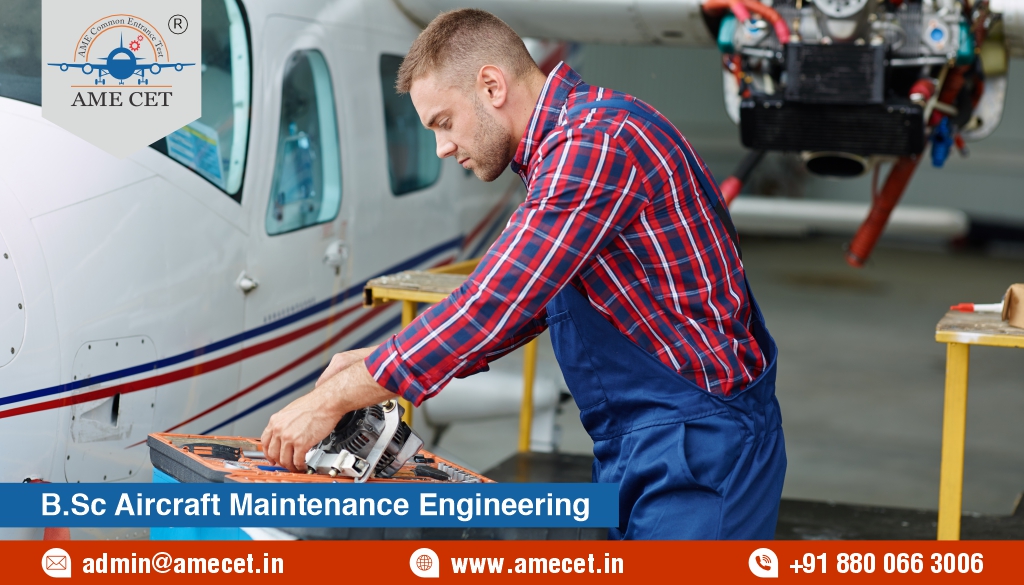What Is a B.Sc. in Aircraft Maintenance Engineering?
Posted on : 28 July, 2024 6:22 pm
A B.Sc. in Aircraft Maintenance Engineering is an undergraduate program focused on the maintenance, repair, and inspection of aircraft. This degree combines theoretical knowledge with practical training to ensure that graduates are well-versed in the latest aviation technologies and industry standards. Students learn about aerodynamics, aircraft systems, propulsion, avionics, and safety regulations. The program prepares individuals to become certified aircraft maintenance engineers, capable of ensuring aircraft safety and reliability. Graduates can pursue careers in airlines, maintenance repair organizations, and aviation regulatory bodies, contributing to the efficiency and safety of the aviation industry.
Page Contents
ToggleProgram Structure
The B.Sc. in Aircraft Maintenance Engineering typically spans three to four years, combining theoretical and practical learning. Core subjects include aerodynamics, aircraft systems, propulsion, and avionics. The program integrates hands-on training through workshops and internships. Students engage in laboratory work to apply classroom knowledge. Safety regulations and compliance are emphasized. The curriculum includes technical and soft skills development. Graduates are prepared for certification and industry roles.
Program Structure:
- Duration: Three to four years.
- Core Subjects: Aerodynamics, aircraft systems, propulsion, avionics.
- Hands-On Training: Workshops and internships.
- Laboratory Work: Practical application of theoretical knowledge.
- Safety Regulations: Emphasis on compliance and safety.
- Technical Skills: Development of essential engineering skills.
- Soft Skills: Communication and problem-solving.
- Certification Preparation: Readiness for industry certification.
Core Subjects
The B.Sc. in Aircraft Maintenance Engineering covers essential subjects like aerodynamics, which studies airflow and flight principles. Aircraft systems delve into mechanical and electronic components. Propulsion focuses on engine mechanics. Avionics covers aircraft electronics and navigation systems. Safety regulations ensure compliance with aviation standards. Materials science examines aircraft materials. Inspection techniques teach fault detection. Maintenance practices focus on repair and upkeep protocols, preparing students for comprehensive aircraft maintenance roles.
Core Subjects:
- Aerodynamics: Principles of airflow and flight.
- Aircraft Systems: Mechanical and electronic components.
- Propulsion: Engine mechanics and dynamics.
- Avionics: Aircraft electronics and navigation.
- Safety Regulations: Compliance with aviation standards.
- Materials Science: Study of aircraft materials.
- Inspection Techniques: Fault detection methods.
- Maintenance Practices: Repair and upkeep protocols.
Practical Training
Practical training in a B.Sc. in Aircraft Maintenance Engineering program includes hands-on workshops where students work on real aircraft components. Internships offer industry experience, while laboratory sessions provide practice with diagnostic tools. Simulation exercises help in understanding aircraft systems. Technical maintenance tasks are taught under supervision. Safety drills ensure adherence to protocols. Problem-solving scenarios develop critical thinking. On-the-job training fosters industry readiness and compliance with aviation standards.
Practical Training:
- Hands-On Workshops: Real aircraft components.
- Internships: Industry experience.
- Laboratory Sessions: Practice with diagnostic tools.
- Simulation Exercises: Understanding aircraft systems.
- Technical Maintenance Tasks: Supervised training.
- Safety Drills: Protocol adherence.
- Problem-Solving Scenarios: Critical thinking development.
- On-the-Job Training: Industry readiness and compliance.
A B.Sc. in Aircraft Maintenance Engineering develops crucial skills such as technical proficiency in diagnosing and repairing aircraft systems. Students enhance their problem-solving abilities and attention to detail. Effective communication is fostered for teamwork and reporting. Knowledge of safety protocols ensures compliance. Hands-on training builds practical skills, while critical thinking aids in troubleshooting. Time management skills are honed, and an understanding of aviation regulations is emphasized.
Skills Developed:
- Technical Proficiency: Diagnosing and repairing aircraft systems.
- Problem-Solving: Addressing technical issues.
- Attention to Detail: Ensuring precision and accuracy.
- Communication: Teamwork and reporting.
- Safety Protocols: Knowledge and compliance.
- Practical Skills: Hands-on training.
- Critical Thinking: Troubleshooting and decision-making.
- Time Management: Efficient workflow management.
Certification and Licenses
Certification and licenses are essential for aircraft maintenance engineers. Graduates must pass exams from aviation regulatory bodies like the FAA or EASA. Obtaining an Airframe and Powerplant (A&P) license is crucial. Continuous education is required for license renewal. Specialized certifications in avionics or specific aircraft models enhance career prospects. Practical experience and training hours are mandated. Compliance with safety regulations is emphasized. Professional development ensures up-to-date skills.
Certification and Licenses:
- Regulatory Exams: FAA or EASA exams.
- A&P License: Airframe and Powerplant certification.
- Continuous Education: Required for license renewal.
- Specialized Certifications: Avionics or specific aircraft models.
- Practical Experience: Mandated training hours.
- Safety Compliance: Adherence to regulations.
- Professional Development: Ensuring up-to-date skills.
- Enhanced Career Prospects: Certifications boost opportunities.
In conclusion, a B.Sc. in Aircraft Maintenance Engineering is a comprehensive program that equips students with the knowledge and practical skills necessary for a successful career in aviation maintenance. The program covers essential subjects, provides hands-on training, and develops critical skills such as technical proficiency, problem-solving, and attention to detail. Graduates are prepared for certification and licensing, ensuring they meet industry standards and regulations. With a strong educational foundation and practical experience, they are well-positioned to pursue diverse career opportunities in airlines, maintenance organizations, and regulatory bodies, contributing to the safety and efficiency of the aviation industry.

